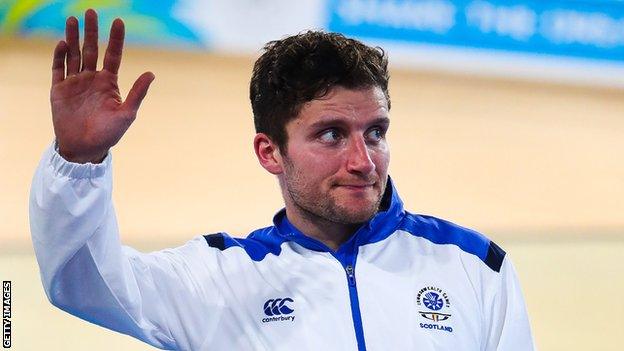Simone Biles criticism baffles Callum Skinner: Mental health 'not death of sport'
- Published

Callum Skinner says winning Commonwealth gold was not the 'magic cure to make me feel better'
"I think some people have quoted it as the death of sport - it's nowhere near that level."
Among the widespread support for American gymnast Simone Biles since she pulled out of the Olympic women's team final, there have been dissenting voices too.
Broadcaster Piers Morgan has been perhaps the most high-profile, tweeting "RIP Sport" in relation to an article that said Biles' withdrawal was "more impressive than winning".
Within days of Biles pulling out of the final, it was announced England cricketer Ben Stokes was taking "an indefinite break" from the game to prioritise his mental wellbeing.
"This isn't the start of a tidal wave of athletes suddenly pulling out of events because of mental ill health," said Olympic gold medallist Callum Skinner.
"It's just athletes being honest."
Skinner won Olympic cycling team sprint gold and sprint silver for Great Britain at Rio 2016.
The 28-year-old, who was later diagnosed with depression, said he "almost went through a bit of a breakdown" at the 2018 Commonwealth Games before claiming bronze for Scotland in the 1km time trial.
Speaking to BBC Radio 5 live, the Scot said: "I think some people have quoted it as the death of sport - it's nowhere near that level.
"Athletes want to compete and be on the stage - that's why I fought so hard to get back."
Winning medal not 'magic cure' to feeling better
Skinner said it was hard to compare "like for like" with his situation and Biles'.
The American has pulled out of Sunday's vault and uneven bars finals and is yet to decide if she will compete in the finals of the floor (2 August) and balance beam (3 August).
"I did go back to competition and did win a medal but I almost pinned that performance and winning a medal as a magic cure to make me feel better," said Skinner.
"At the time, it really did anything but. It didn't change my emotion, it didn't change how I was feeling.
"We are really lucky in track cycling that we get to wear helmets so people can't see what emotions you are pulling underneath.
"I would just say to Simone to do it for herself and don't necessarily think that you have to go back to competition to prove anything to anyone or to supress any emotion you might have."
'Athletes used to hide mental health issues behind injury'
Skinner now leads Global Athlete, an organisation set up to push for enhanced rights for athletes.
He said he and other competitors - including legendary American swimmer Michael Phelps - had previously spoken of injuries to cover for mental health issues.
"I've done it and I know of other athletes who have done it too," he added.
"The question that is baffling me is why it is causing such upset in some circles that she is simply being honest about why she has pulled out."

Five new sports at Tokyo 2020: Everything you need to know about the events
The fight for our attention: How can sport broadcasters make themselves the most attractive option?
